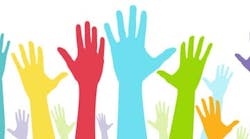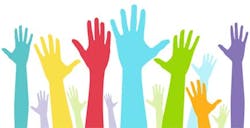What does your dental hygiene oath mean to you?
Finishing dental hygiene school was one of the most exciting times of my life. I was the fifth of six children and, at that time, the only college graduate. I had the honor of paving the way for my other siblings to pursue their dreams. I stood at my pinning ceremony with beaming eyes reciting the dental hygiene oath:
“In my practice as a dental hygienist, I affirm my personal and professional commitment to improve the oral health of the public, to advance the art and science of dental hygiene, and to promote high standards of quality care.
I pledge continually to improve my professional knowledge and skills, to render a full measure of service to each patient entrusted to my care, and to uphold the highest standards of professional competence and personal conduct in the interest of the dental hygiene profession and the public it serves.” (1)
ALSO BY JASMIN HALEY | DO IT: 3 ways to refocus and overcome setbacks
I looked forward to my future and was eager to contribute to improving the public’s health. I vowed that day to uphold the standard that was set before me by the faculty body. What awaited me were challenges that I wasn’t ready to face. My rose-colored glasses were ripped from my eyes and I came to realize that upholding our dental hygiene oath requires courage. The restrictive obstacles of insurance, the personal biases of staff, and the rush of trying to finish many patients in a day often stands in the way of that oath.
Once I became an educator I knew that I wanted to make a positive impact on students’ lives. I wanted to inspire and empower them in their practice so that they can uphold the same standard I vowed to uphold many years before. I had the privilege of teaching ethics and jurisprudence, public health, local anesthesia, and many other courses. It was in my public health and ethics course that I found the opportunity to open the students’ eyes to viewing themselves as professionals. I shared my experiences and coordinated events within the program that helped them think beyond the prophy.
One of the highlights of that journey was creating a spin on the topic of cultural competency. All dental hygiene curriculum must include a component of cultural competency and provide clinical and didactic experiences that will enable the student to be cultural and linguistically competent. In 2014, I pushed the limit of diversity and created a panel that strove for true inclusivity. The panel took an interdisciplinary approach to the discussion of culture as it relates to the LGBT community. You might ask, “Why? Aren’t we in 2016? What does it matter?” It matters! If we are unable to understand the challenges, barriers to care, and language of a culture, how could we provide appropriate care?
My unique experience with working with the HIV/AIDS community engrossed me. Earlier in my career, I found that my education didn’t prepare me to provide culturally appropriate care to the LGB community and especially the transgender patient. Many educational institutions are missing the evolution of diversity. Our panel discussion showed that there was much more to learn. I used my personal experience, the panel discussion I created, and further research to create a dynamite continuing education course that opens this topic for an enlightening conversation.
I was inspired to write this article because of an interaction I had with another health-care worker. The comment they made regarding providing care to this population was shocking. It was clear that this discussion is relevant and needed. I began to ask myself, “What happened to the oath we took at our pinning ceremony? Are the ADHA Code of Ethics and Principles of any value? When did our practice not include making the patient our priority?”
READ MORE | The dental hygiene job market could compromise the value of ethics
Individual states are now establishing cultural competency requirements for licensure renewal. Why? Above all else, patient-centered care is the priority. Dental hygienists are lifelong learners and we cannot provide adequate care or treatment without continuous learning and discussion of these topics. It begins with us understanding our own culture, values, and beliefs. Our understanding of our own culture will help us to understand the needs of our patient. Diversity is no longer black and white. It involves gender, mental health, physical health, gender identity, sexual orientation, ethnicity, and race. Do you feel uncomfortable with any of these topics? Ask yourself why. If your personal feelings cannot be pushed aside to provide appropriate care, consider reevaluating your role in clinical practice. There are many other roles in dental hygiene that may not require direct patient care such as research and corporate jobs.
Dental hygienists must be culturally and linguistically competent whether we like it or not. We pledge to adhere to the highest professional standard when we all recited our dental hygiene oath. We need to create a safe, positive, and affirming space for all of our patients. If through your discovery of personal reflection, you find that you cannot uphold that standard or maintain our ethical principles and values, then consider an alternative setting to practice. The public expects that their dental hygienists will provide competent care and will seek the best for their patients. We owe it to the public we serve now and for years to come.
Reference
1. Dental hygiene oath. Virginia Commonwealth University School of Dentistry. http://www.dentistry.vcu.edu/programs/dentalhygiene/oath/. Accessed July 12, 2016.
For the most current dental headlines, click here.
Jasmin Haley, RDH, BSDH, CDA, is the founder of Beyond the Prophy, LLC and an instructor of dental hygiene at a community college. She has 15 years combined experience in the dental field as a dental hygiene educator, clinician and dental assistant. Haley’s interests include HIV/AIDS, cultural competency and dental public health. She offers continuing dental education and can be reached at: [email protected].

